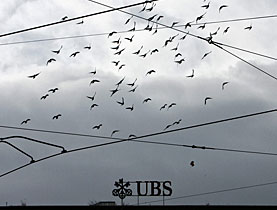Experts defend state help for finance sector

Competition watchdog representatives meeting in Zurich have been defending moves to bailout big financial sector players such as troubled Swiss bank UBS.
At an international conference in the city, speakers warned, however, that these economic crisis measures should be temporary and that states should not return to the “bad old days” of protectionism.
The three-day International Competition Network’s (ICN) annual conference, which started on Wednesday, brings together competition commission members from around the world to discuss policy issues.
Delegates heard that these agencies, which are mandated to defend, protect and extend markets, had thrived and enjoyed confidence when times were good.
“What we are now faced with, certainly in the finance sector and arguably in some others, is a massive market failure and the tide has turned very quickly,” David Lewis, the ad-interim chairman of the ICN, told reporters at a media conference.
Governments were now turning back to protectionism of their industries and to subsidies, Lewis said. This, he says, is valid for the financial sector because it, “oils the wheels of the entire economy”.
According to Lewis, help for industries which had problems before the financial crisis, like the car sector, will only be temporary. “These companies will simply go to the wall later,” said Lewis.
His comments came after Monday’s announcement that General Motors, a car industry icon in the United States, had filed for bankruptcy protection as part of a US government plan to shrink the automaker to a sustainable size and give it a 60 per cent majority ownership stake. It is the second US car company after Chrysler to undergo such a move.
UBS decision
For his part, Walter Stoffel, president of the Swiss Competition Commission, defended the Swiss government’s bailout of the country’s largest bank UBS last October.
But the government’s role should only be temporary, he said, adding that there would be a conflict of interest if, as a bank shareholder, the government drew up a new financial regulatory framework.
“It should be borne in mind that it is extraordinary and that one should get out as soon as possible,” Stoffel said.
Lasting interventions should not be made. “One should resist the temptation to say now we are in it, we try to govern a bank or an industry. We should come back to the principles we had before,” he told swissinfo.ch at the media conference.
Protectionism has particular effects for small Switzerland, whose economy relies heavily on exports, said Swiss Economics Minister Doris Leuthard in her opening address to the conference.
Short-sightedness
Stoffel said that relaunch measures tailored to one economy in particular were “most dangerous”.
“Around half of the Swiss economy really depends on selling outside so it is extremely short- sighted to say measures that we take can only be used in Switzerland. What makes economies better in other parts of the world, especially for our neighbours, is advantageous for our economy as well.”
Lewis said that in these straitened times, competition commissions should work in their advisory capacities and raise their voices, for example, when mergers of big banks take place which might not normally be allowed or when companies try to be opportunist about bailouts.
Working with industrial and social policy makers and trade representatives to develop measures compatible with competition policy is also key, he added.
“I’m still confident that the way out of the crisis is where markets thrive again,” Lewis said. “There may be different rules imposed on the financial sector and on markets generally but markets will be the way out, even if to some extent they are the root of the crisis as well.”
Isobel Leybold-Johnson in Zurich, swissinfo.ch
The International Competition Network’s (ICN) annual conference is taking place in Zurich from June 3-5, 2009.
Around 600 international competition experts, members of international organisations and non-governmental advisors, including representatives of the legal, business, economic, consumer and academic communities, will be taking part. More than 80 countries are represented.
The ICN was formed in 2001 and its membership includes nearly all the world’s competition agencies.
The interim ICN chairman, David Lewis, is also chairman of the South African Competition Tribunal.

In compliance with the JTI standards
More: SWI swissinfo.ch certified by the Journalism Trust Initiative











You can find an overview of ongoing debates with our journalists here . Please join us!
If you want to start a conversation about a topic raised in this article or want to report factual errors, email us at english@swissinfo.ch.